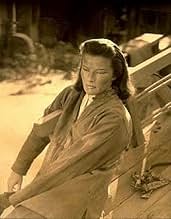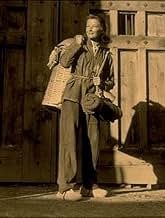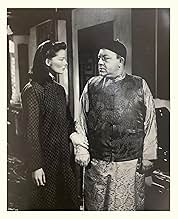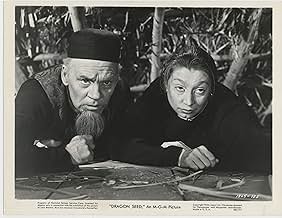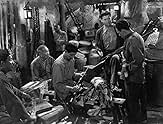CALIFICACIÓN DE IMDb
5.9/10
1.4 k
TU CALIFICACIÓN
Agrega una trama en tu idiomaThe lives of a small Chinese village are turned upside down when the Japanese invade it, and a heroic young woman leads her fellow villagers in an uprising against these invaders.The lives of a small Chinese village are turned upside down when the Japanese invade it, and a heroic young woman leads her fellow villagers in an uprising against these invaders.The lives of a small Chinese village are turned upside down when the Japanese invade it, and a heroic young woman leads her fellow villagers in an uprising against these invaders.
- Nominado a 2 premios Óscar
- 2 nominaciones en total
Philip Ahn
- Leader of City People
- (sin créditos)
Albert Baldo
- Japanese Soldier
- (sin créditos)
- Dirección
- Guionistas
- Todo el elenco y el equipo
- Producción, taquilla y más en IMDbPro
Argumento
¿Sabías que…?
- TriviaFilmed in 1943 on the MGM lot in Culver City, CA, the film features an unusual assortment of non-Asian actors with odd accents playing Chinese and Japanese: Russian-born and Stanislavski-trained Akim Tamiroff as Wu Lien; Turhan Bey, Viennese born son of a Turkish father and Czechoslovakian mother as the middle son, Lao Er Tan; New England patrician Katharine Hepburn as his wife; American Aline MacMahon--no longer one of the wisecracking Las insaciables (1933)--as the wife of Ling Tang; English-born Henry Travers (best remembered as Clarence the Angel from ¡Qué bello es vivir! (1946)) as the Third Cousin"; Irish-American J. Carrol Naish as the Japanese Kitchen Overseer; and finally Jewish Robert Lewis, co-founder of the Actors Studio and Meryl Streep's teacher at the Yale Drama School, as Japanese Capt. Sato.
- ConexionesEdited from Madre tierra (1937)
Opinión destacada
Pearl Buck's novel "Dragon Seed" was made into a film in 1944. Back then, for reasons known only to themselves, the studios did not cast Chinese to play Chinese in major roles. Looking at the film now, I guess it's important to remember that to the 1944 audiences, there was nothing unusual about this.
Taking the non-Chinese casting out of the equation for just a moment, "The Dragon Seed" is a powerful story of what happened to the Chinese during the barbaric occupation of the Japanese. The story focuses on the family of Ling Tan (Walter Huston), his wife (Aline McMahon), and his sons, Lao Er Tan (Turhan Bey) and wife Jade (Katharine Hepburn), Lao San Tan (Hurd Hatfield) and Lao Ta Tan (Robert Bice). Jade is a modern thinker, and part of the story deals with the struggles between the new times and old traditions and the role of women. The other part of the story is how various people deal with the occupation. There is submissiveness, resistance, and collaboration.
I'm most moved by a review on this site by a man who has a Chinese father-in-law. His father-in-law loved the film. No one in China knew that America was on their side; they were taught to hate the western world.
So if a Chinese man can overlook the casting, I suppose I can too, but I can't. The acting is fantastic, but one wonders what was wrong with Anna May Wong, Keye Luke, Sen Yung, and why only the extras and children seemed to be at the very least Asian. For me the most egregious casting was that of Katharine Hepburn. Her acting came alive in the second part of the film. She once said that Spencer Tracy made her seem very feminine. He's not in this movie. In the beginning, in the love scenes with her husband, it doesn't come off. She's better when the character shows strength. Her finishing school accent and wig don't cut it either. Very difficult to watch. Also, she seems oddly matched with Turhan Bey.
This film is still well worth seeing. It's very dramatic and emotional, with a very big and poignant ending.
Taking the non-Chinese casting out of the equation for just a moment, "The Dragon Seed" is a powerful story of what happened to the Chinese during the barbaric occupation of the Japanese. The story focuses on the family of Ling Tan (Walter Huston), his wife (Aline McMahon), and his sons, Lao Er Tan (Turhan Bey) and wife Jade (Katharine Hepburn), Lao San Tan (Hurd Hatfield) and Lao Ta Tan (Robert Bice). Jade is a modern thinker, and part of the story deals with the struggles between the new times and old traditions and the role of women. The other part of the story is how various people deal with the occupation. There is submissiveness, resistance, and collaboration.
I'm most moved by a review on this site by a man who has a Chinese father-in-law. His father-in-law loved the film. No one in China knew that America was on their side; they were taught to hate the western world.
So if a Chinese man can overlook the casting, I suppose I can too, but I can't. The acting is fantastic, but one wonders what was wrong with Anna May Wong, Keye Luke, Sen Yung, and why only the extras and children seemed to be at the very least Asian. For me the most egregious casting was that of Katharine Hepburn. Her acting came alive in the second part of the film. She once said that Spencer Tracy made her seem very feminine. He's not in this movie. In the beginning, in the love scenes with her husband, it doesn't come off. She's better when the character shows strength. Her finishing school accent and wig don't cut it either. Very difficult to watch. Also, she seems oddly matched with Turhan Bey.
This film is still well worth seeing. It's very dramatic and emotional, with a very big and poignant ending.
- blanche-2
- 10 oct 2010
- Enlace permanente
Selecciones populares
Inicia sesión para calificar y agrega a la lista de videos para obtener recomendaciones personalizadas
- How long is Dragon Seed?Con tecnología de Alexa
Detalles
Taquilla
- Presupuesto
- USD 3,000,000 (estimado)
- Tiempo de ejecución2 horas 28 minutos
- Relación de aspecto
- 1.37 : 1
Contribuir a esta página
Sugiere una edición o agrega el contenido que falta

Principales brechas de datos
By what name was La estirpe del dragón (1944) officially released in India in English?
Responda


